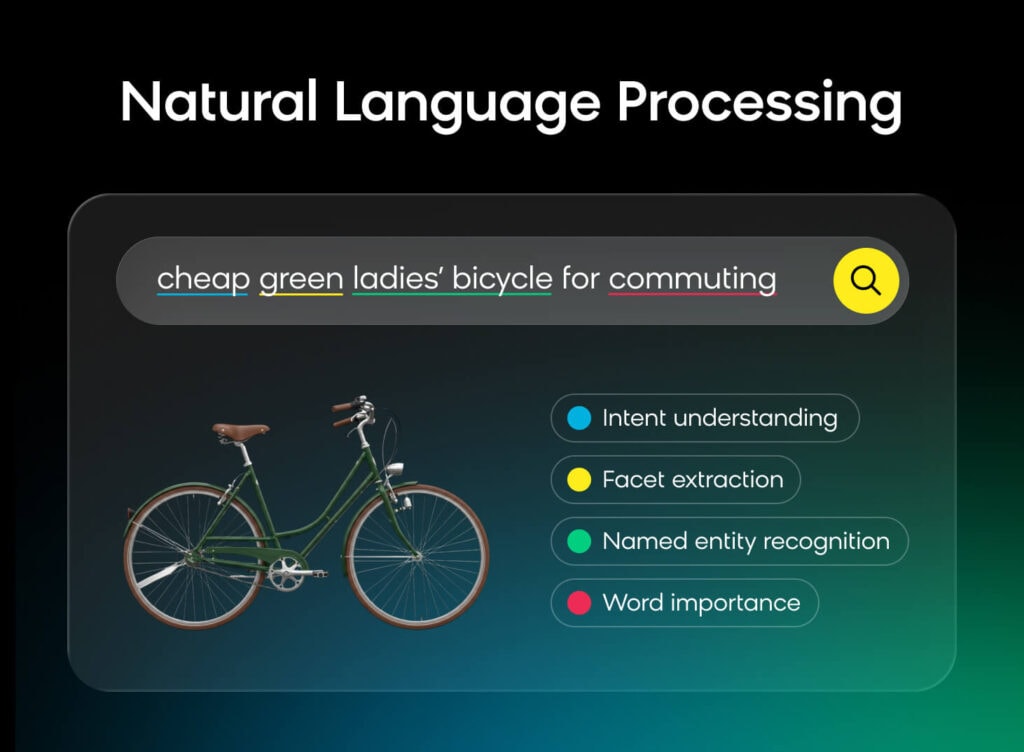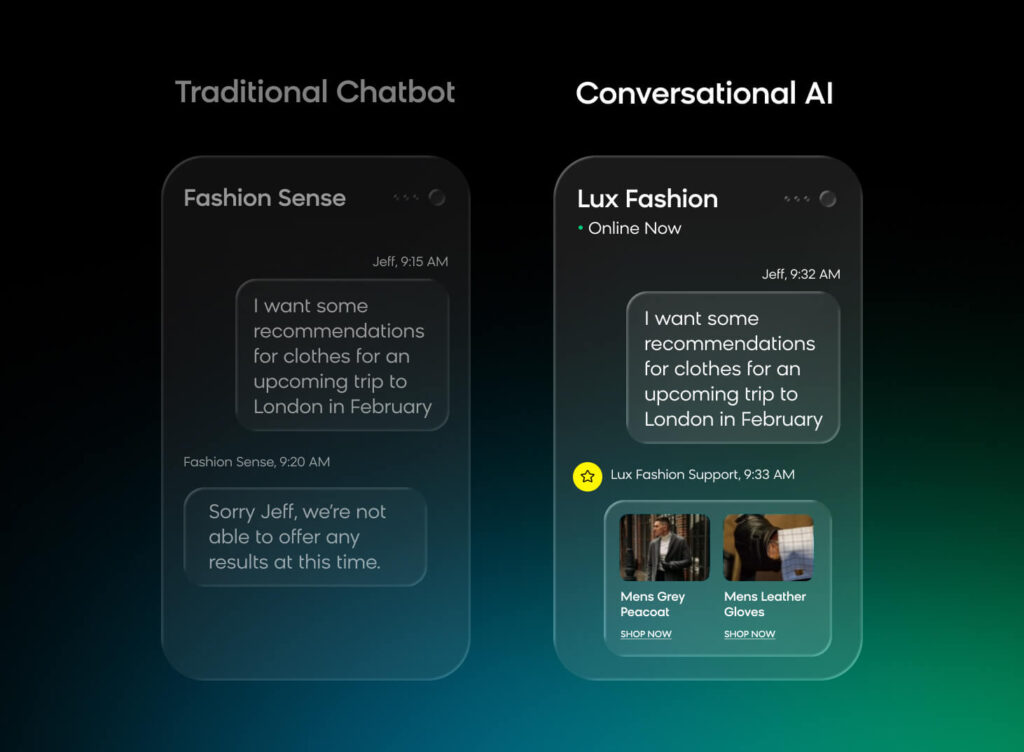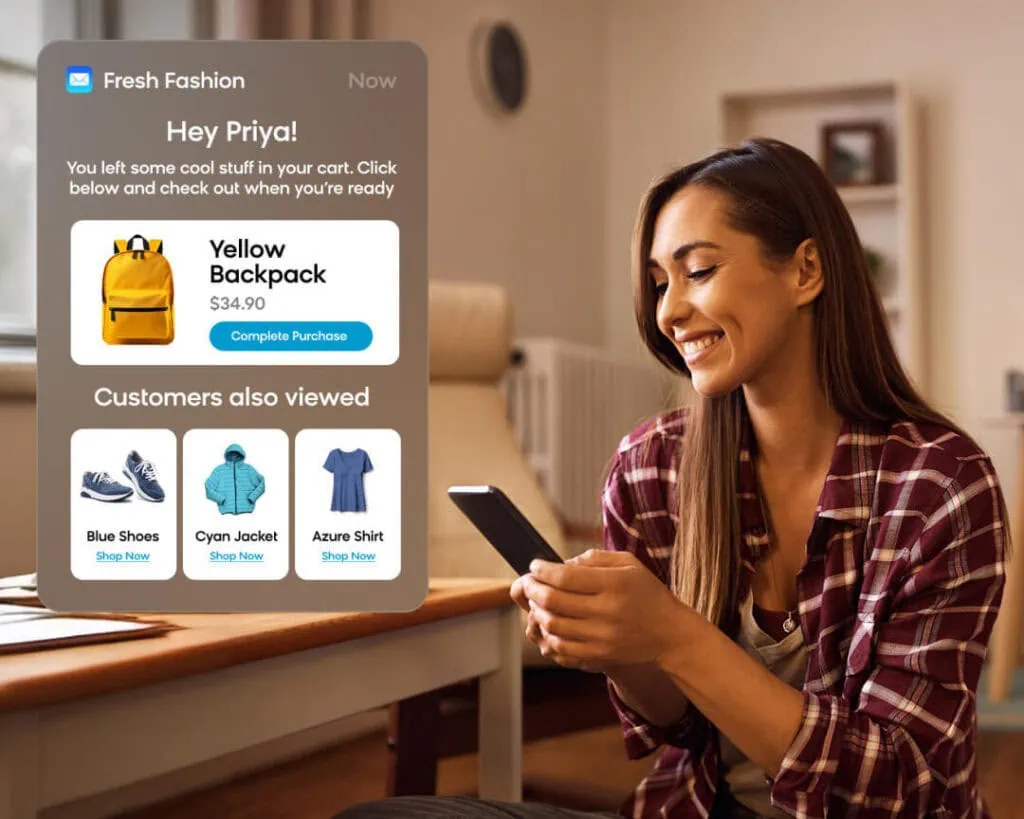Forget the days of impersonal service and irrelevant recommendations — the virtual shopping assistant revolution is here.
We’ve all heard the hype about AI assistants, but for those of us in the ecommerce trenches, these whispers are becoming a reality. In fact, the virtual assistant market is growing quickly at an estimated compound annual growth rate (CAGR) of 32.9% from 2025 to 2032.
AI assistants, once a thing of science fiction novels, are now learning and evolving at lightning speed, ready to deliver a tailor-made shopping experience that enhances omnichannel customer engagement.
Best of all, they’re no longer limited to robotic scripts and stilted language. Today’s AI chatbots engage in natural, nuanced conversations, building genuine connections that ultimately boost your bottom line.
In this comprehensive guide, we’ll explore what virtual shopping assistants are, how AI powers them, their key benefits, and practical steps to implement them successfully. You’ll also discover real-world use cases, implementation challenges, and how to choose the right platform for your business.
- The what: Virtual shopping assistants use AI to create human-like conversations with customers and help answer questions, provide recommendations, and more.
- The how: Unlike chatbots, which rely on predefined responses, AI assistants use agentic AI to autonomously guide customers through the shopping journey.
- The why: AI virtual assistants can improve customer engagement, save your company time and money, and create a much more seamless online shopping experience.
What Is a Virtual Shopping Assistant?
Imagine your ideal sales associate: kind and helpful, but never pushy. They offer the right kind of information when you need it, and exhibit a next-level understanding of the products in stock and which one may be best for you.

A virtual shopping assistant simulates your favorite in-store shopping experience while you’re shopping online, offering product information, order updates, website navigation assistance, and much more.
With the help of data analytics and predictive capabilities, AI shopping assistants personalize the user experience, streamline decision-making processes, and ultimately improve customer satisfaction. To do this, these tools engage advanced algorithms, machine learning, and natural language processing (NLP) to decipher user queries and offer tailored recommendations.
You may have heard of human virtual assistants. In this article, we’ll focus on AI virtual assistants and not human assistants. Unlike AI virtual assistants, which are digital algorithms that help customers, human virtual assistants are real people hired to complete customer service tasks remotely. They handle customer inquiries, provide guidance, and assist with tasks via email, chat, or phone.
It’s important to note that AI assistants don’t replace people but expand upon human capabilities. AI shopping assistants can scale your support efforts across multiple platforms, like your website, mobile app, and SMS. Plus, they can handle large volumes of customer inquiries and deliver consistent messaging, no matter the location or time of day. The result is a smoother and more successful customer experience that is then enhanced by human agents.
How Is AI Used in Virtual Assistants?
Agentic AI is the driving force behind modern shopping assistants. With this next-gen artificial intelligence system, AI agents can be trained and empowered to handle a wide range of tasks — including playing the role of an online shopping assistant for your business.
AI-powered shopping assistants can autonomously perform complex duties, make decisions, and learn from interactions, which boils down to the following essential capabilities:
Data Analysis and Machine Learning
Data analysis and consumer behavior interpretation are the most fundamental and important capabilities that AI assistants handle. AI meticulously analyzes data using sophisticated algorithms, identifying patterns in past behavior and established preferences.
But it doesn’t just crunch numbers. Agentic AI can learn and adapt to each new data point, incorporating context so it can better serve your customers.
With an AI conversational shopping agent, customer data is analyzed to understand what each individual shopper wants, so online retailers can always recommend products that fit their needs.

Predictive Analytics
Virtual shopping assistants also leverage AI for predictive analytics. By analyzing historical data and looking at what groups of shoppers are currently buying, you can train these AI systems to forecast future trends.
Agentic AI’s ability to use real-time data makes it particularly useful in predicting and satisfying shopper needs. An agentic AI-powered shopping assistant can tap into the up-to-the-minute relationship that a shopper has with a brand, knowing their latest purchase, what they last browsed, what they searched for, and more.
With this understanding, an AI shopping assistant can suggest the most relevant products that customers might want before they even begin searching for them.
Natural Language Processing
Finally, no discussion of AI-powered shopping assistants would be complete without mentioning how NLP fuels highly accurate responses.
Natural language processing capabilities allow ecommerce chatbot solutions to engage users in conversation, resulting in smoother, more human-like interactions, which helps with increasing sales or driving another desired action.
Plus, NLP enables AI-powered site search, which understands what customers want to deliver more personalized shopping experiences.
How Do AI Assistants Work?
Let’s imagine that you’re in the market for a new pair of athletic shoes. When visiting a shoe retailer’s website, you encounter an AI shopping assistant: a friendly, highly knowledgeable digital tool specifically designed to help you shop online.
To provide optimal help, the virtual shopping agent analyzes what you’ve clicked on, what you’ve asked, and what you’ve bought before. By looking at all of this data, the assistant learns more about you and your preferences.
Now, when you ask the AI shopping assistant something, it’s not just listening to the words you say, but working to understand what you mean.
This is where natural language processing comes into play. NLP helps the assistant understand your language and the context of what you’re saying. If you express that you’re looking for “athletic shoes for running,” the assistant won’t suggest athleisure shoes unsuitable for intense workouts. It knows you’re looking for shoes for a specific purpose and will honor that with the right product recommendations.

A great AI chatbot will take these amazing abilities one step further with semantic understanding, or understanding the deeper meaning beyond what you’re asking. This helps them suggest not just any athletic shoes, but the best ones for you based on your past purchases and what shoppers similar to you have found suitable for running.
AI shopping assistants protect you from making regrettable purchases while also getting to know you over time. By collecting and analyzing loads of helpful customer data, the virtual assistant becomes progressively smarter. It tweaks its suggestions and advice based on what works best for you, making your online shopping experience feel less like fielding automated responses from a robot and more like a conversation with a good friend who has impeccable taste.
Conversational AI vs. Chatbot
Conversational AI and chatbots are often used interchangeably. While there is some overlap between the two technologies, each one has particular capabilities.
To understand conversational AI vs. chatbots, imagine that each technology is an actor at a community theater.
Traditional chatbots are like rehearsed actors cast to perform in a play. Chatbots have a set script and predefined conversation flows, which allow them to respond adequately to specific queries. However, they fall short when users have a complicated question or wish to engage in a more free-flowing conversation (like you might with sales associates in brick-and-mortar stores).
Conversational AI takes the form of an improv actor untethered by a script. Because conversational AI can understand human language and all its subtleties at a deep level, it adapts dynamically to user inputs. This allows it to comprehend user queries beyond simple keywords, decipher intent, and respond contextually, just like a human would in a conversation.

Although the terms differ, it’s possible to use conversational AI technology within a chatbot shopping assistant. AI chatbots are helpful for a few reasons:
- Chatting feels more like talking to a friend than a machine. When using conversational AI in retail, people don’t feel like they’re punching buttons; they feel listened to and understood. It’s no surprise that within the past few years, multiple industries have seen a 250% increase in interactions handled by a conversational AI tool.
- Advanced interactions fuel the hyper-personalization engine. When conversational AI platforms can pick up more from what users say, they can suggest more products and services that are well-suited to their needs.
- Conversational AI grows more intelligent over time. The more your customers use it, the smarter it becomes, making responses and suggestions better with every interaction.
Ultimately, bringing conversational commerce to your chatbot shopping assistant isn’t just about enhancing interactions — it’s about creating an immersive, personalized brand experience that resonates with online shoppers, making them feel special and cared for so they stay loyal to your brand.
The Benefits of AI Shopping Assistants
AI shopping assistants shake up how we shop. From heightened engagement to round-the-clock availability, these AI shopping assistants are redefining the ecommerce world.
Let’s explore the benefits of AI chatbots and how they create a human-centered, highly personalized shopping experience for your customers.
What Are the Main Benefits of Virtual Shopping Assistants?
AI shopping assistants are essentially friendly, tech-powered concierges, offering personalized advice and instant support to boost customer engagement at every turn. They become customers’ personal shoppers, creating a personalized, one-on-one experience.
By keeping track of customer interactions (i.e., what they like, how they shop, and what they ultimately buy), these virtual shopping assistants provide relevant suggestions that are likely to result in a conversion.

What makes these tools even more powerful is their ability to proactively engage your customers. They anticipate user behavior and needs, stepping in to offer assistance or personalized recommendations even before a customer asks. This approach shows shoppers that your brand understands their customer journey and wants to make the road from discovery to purchase as seamless as possible.
By providing timely and relevant support, AI shopping assistants elevate the shopping experience and forge closer bonds between your customers and your brand.
How Do AI Assistants Improve the Customer Experience?
Using AI chatbots for automated tasks saves time and money. By handling routine inquiries and tasks, AI assistants take some strain off customer support staff, so employees can focus on tasks that require human expertise.
Instead of responding to the same questions for hours, people can dig into projects that require empathy, strategic thinking, and other skills that AI can’t replicate. And the numbers speak for themselves: Gartner predicts that AI will reduce contact center labor costs by $80 billion by 2026, highlighting the significant financial impact of these tools.
Because AI shopping assistants automate more tedious aspects of a sales, marketing, or customer service job, these tools enhance business operations by ensuring consistency and minimizing errors. By maintaining high accuracy and consistency, AI assistants avoid costly errors that can affect customer satisfaction and productivity while saving time and preventing rework.
What Inventory Management Benefits Do Virtual Assistants Provide?
Integrating AI shopping assistants with inventory systems lets them have real-time knowledge of what’s in stock and avoid disappointing customers by recommending out-of-stock items. It also takes care of managing inventory by checking product availability everywhere so you can get shipments out fast and reduce backorders

Plus, these capabilities empower ecommerce brands to make informed decisions regarding their stock. With a good eye on your inventory, you’re able to determine which products are flying off the shelves and which ones are gathering dust. This lets you adjust your future orders accordingly, so you always have what customers want and avoid wasting money on items that are less likely to sell.
How Does 24/7 Availability Impact Customer Satisfaction?
Having AI chatbots around all the time is a breakthrough in customer service. They don’t stick to regular hours like traditional services and can provide consistent and dependable service 24/7.
An AI shopping assistant can act as an “always-on” customer relationship strategist, consistently available whenever a customer decides to shop or ask a question — after all, who hasn’t made a late-night impulse purchase?
When your business can help customers at odd hours, they take notice. Customers feel valued when their questions are answered promptly, no matter the time. This ongoing support builds a strong connection between customers and businesses, making them more likely to come back and make another purchase.
How To Implement a Virtual Shopping Assistant
Implementing a virtual shopping assistant requires careful planning and strategic execution. The success of your AI assistant depends on proper integration with existing systems, comprehensive training, and ongoing optimization based on user feedback and performance metrics.
A well-implemented virtual shopping assistant can transform your customer experience while providing measurable returns on investment through increased conversions, reduced support costs, and enhanced customer satisfaction.
Step 1: Define Your Objectives and Use Cases
Start by identifying specific customer pain points your assistant will address. Establish clear KPIs for success measurement, such as conversion rates, customer satisfaction scores, and support ticket reduction. Determine primary functions like product recommendations, order tracking, and customer support to ensure your assistant serves a clear business purpose.
Step 2: Choose the Right AI Platform
Evaluate platforms based on natural language processing capabilities, integration options with your existing tech stack, and scalability features. Consider how easily you can customize the assistant’s personality and responses to match your brand voice. Look for solutions that offer comprehensive analytics and omnichannel support.

Step 3: Integrate With Your Data Systems
Connect customer databases for personalization capabilities and link inventory management systems for real-time availability updates. Ensure seamless integration with your AI-powered personalization tools to create a unified customer experience across all touchpoints.
Step 4: Train and Configure Your Assistant
Develop conversational flows for common customer scenarios and create a comprehensive knowledge base covering your products, policies, and procedures. Test extensively across different customer journey touchpoints to ensure consistent performance and accurate responses.
Step 5: Launch and Optimize
Start with a limited rollout to gather initial feedback from a select group of customers. Monitor performance metrics including response accuracy, customer satisfaction scores, and conversion rates. Continuously refine the assistant based on user interactions, feedback, and evolving business goals.
Choosing the Right AI Assistant Platform
Selecting the optimal virtual shopping assistant platform is crucial for maximizing the benefits of AI-powered customer engagement. The right platform should align with your business objectives, integrate seamlessly with existing systems, and provide the flexibility to evolve with changing customer needs.
Consider these essential evaluation criteria when choosing your AI assistant platform:
- Natural language processing capabilities: Look for advanced NLP that understands context, intent, and conversational nuances to deliver human-like interactions
- Integration flexibility: Ensure the platform can connect with your CRM, inventory management, and other critical business systems
- Customization options: Evaluate how easily you can tailor the assistant’s personality, responses, and functionality to match your brand voice
- Scalability and performance: Consider platforms that can handle increased traffic and expand functionality as your business grows
- Analytics and insights: Choose solutions that provide detailed performance metrics and customer interaction data for continuous improvement
- Omnichannel support: Verify the platform can deliver consistent experiences across web, mobile, social media, and other customer touchpoints
When evaluating options, consider exploring comprehensive solutions like Bloomreach’s AI capabilities that combine conversational AI with personalization and customer data insights for a unified approach to customer engagement.
Real-World Use Cases for Virtual Shopping Assistants
Virtual shopping assistants are transforming customer experiences across various industries. Here are proven use cases demonstrating their practical applications:
Fashion and retail: AI assistants help customers find clothing that matches their style preferences, size, and budget. They can suggest complete outfits, provide styling advice, and offer alternatives when items are out of stock.

Electronics and technology: These assistants excel at explaining complex product specifications, comparing features across different models, and recommending accessories or complementary products based on customer needs.
Beauty and cosmetics: Virtual assistants can suggest products based on skin type, color preferences, and beauty goals, while also providing application tips and ingredient information for customers with specific sensitivities.
Home and garden: AI shopping assistants help customers navigate extensive product catalogs, suggest room-specific solutions, and provide project guidance for home improvement purchases.Grocery and food: These tools can create shopping lists based on dietary preferences, suggest recipe ingredients, and recommend products based on previous purchases and seasonal availability.
Smoother Shopping Experiences Begin With Bloomreach
Believe the hype: AI shopping assistants mark a new phase in customer engagement and conversational AI in online retail.
The benefits of conversational AI agents extend beyond simple automation. These assistants break out of the usual boundaries of customer service, providing personalized recommendations and adapting to individual preferences for an AI shopping experience that customers love to use.
As more businesses embrace AI tools, online shopping becomes more personal. Using these tools isn’t just a technological leap, but a commitment to keep up with customer needs as they change over time, so your business can build lasting connections and fuel sustainable growth.
Whether you’re a small startup or a larger enterprise, Bloomreach’s conversational AI agent can accelerate your growth. Powered by Loomi AI, our conversational shopping solution includes all of the features you need to drive revenue and deliver the ultimate customer experience. Learn more today.













